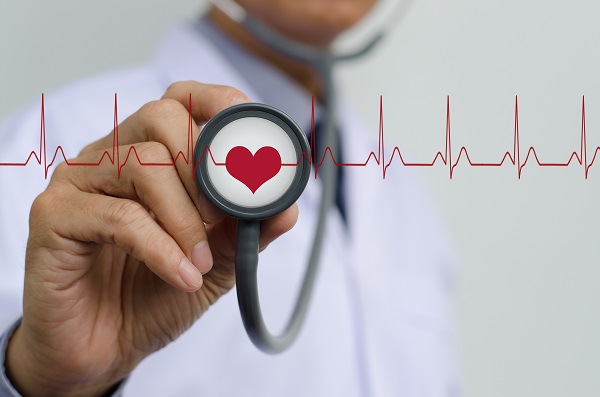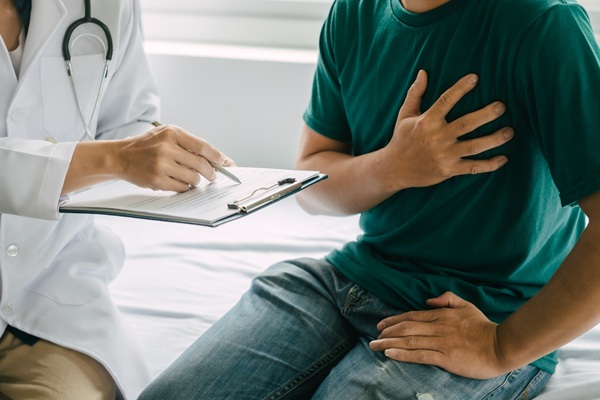What to Expect During an Echocardiogram

An echocardiogram is a diagnostic test, similar to an ultrasound, that is used to produce images of the heart. The procedure is used to observe how well the heart is able to pump blood and to look for signs of heart disease, as well as monitor certain heart conditions and determine the necessary course of treatment. When a doctor orders an echocardiogram, it can be frightening if someone is unfamiliar with the procedure. Here is what to expect during the test.
What is an echocardiogram?
An echocardiogram is a type of non-invasive test that uses sound waves to create images of the heart to aid in diagnosing various types of heart diseases and defects, check for structural issues in the heart and monitor the heart’s ability to pump blood. The test also gives insight as to how the heart valves are functioning.
What is the procedure like?
The procedure requires no prior preparation. Before the test begins, patients are given a hospital gown to change into. They will then lay down on an examination table, and the echocardiographer will place a small amount of gel onto the chest and attach electrodes onto certain areas of the chest. The transducer, a small wand which produces the sound waves needed to get images of the heart, is placed upon and moved around on the chest. The echocardiographer will ask the patient to change positions and take several deep breaths during the duration of the procedure to get images of the heart from various angles. The test is usually done in half an hour, but in some cases, it can take up to an hour to complete.
Does it hurt?
The echocardiographer will occasionally have to press down with the transducer during the procedure; this is necessary to produce clearer images and results in a mild amount of pressure that can be slightly uncomfortable. If patients find themselves feeling very uncomfortable, they should mention it to the echocardiographer. The test, however, is painless.
Are there any risks?
Echocardiograms are safe. The procedure does not use radiation as other imaging tests do, and it is non-invasive. There are no known risks or side effects to the test.
What happens after the procedure?
Patients can resume their normal activities following the test. Results usually come back in a short amount of time, and doctors will thoroughly go over the details of the results. If there is any cause for concern in the results, the doctor may order additional tests. Further testing will likely not be needed if there are no significant findings.
Conclusion
An echocardiogram is a painless, non-invasive test that uses sound waves to produce clear images of the heart for examination. It is used to check the heart and heart valves, diagnose a variety of heart diseases and check for any abnormalities in the heart’s structure. More tests may be ordered if any results are concerning.
Request an appointment here: https://boyntonbeach.floridapremiercardio.com or call Florida Premier Cardiology at (561) 229-1411 for an appointment in our Boynton Beach office.
Check out what others are saying about our services on Yelp: Read our Yelp reviews.
Recent Posts
Heart disease treatment encompasses a range of interventions, from lifestyle changes and medications to surgical interventions. Individuals can manage their condition and improve their quality of life by working with a cardiologist. Successful heart disease treatment starts with the patient having the information they need to make informed decisions about their health.Also known as cardiovascular…
A heart specialist is a doctor specializing in diagnosing and treating cardiovascular conditions. Patients may be referred to one of these doctors for several reasons, from diagnosing a heart health issue to getting cleared for surgery. However, seeing a heart specialist is even more crucial for those either experiencing the signs of heart disease or…
Cardiologists perform angioplasty to open blocked arteries, specifically those caused by coronary disease. This minimally invasive alternative to open heart surgery can restore proper blood flow to the heart and often reverse the fast track to a heart attack. However, learning when one is necessary is crucial for treatment success.Coronary artery disease (CAD) is a…
The heart's valves must remain healthy and upright to promote an overall healthy heart and cardiovascular system. However, sometimes, they can weaken. Fortunately, various valvular disease treatments are available to address damage. Whether valves begin to narrow or leak, timely treatment is necessary.There are two main types of heart valve disease: regurgitation and stenosis. The…


